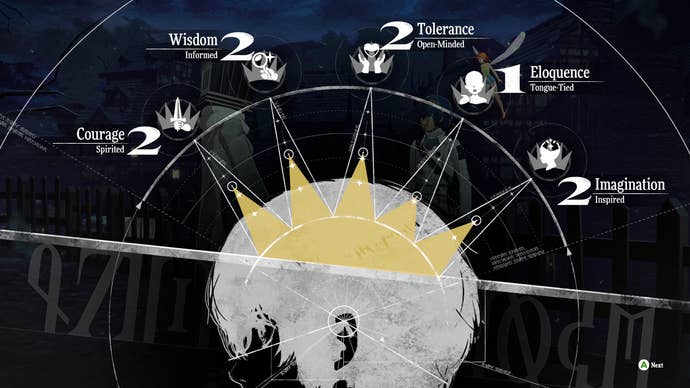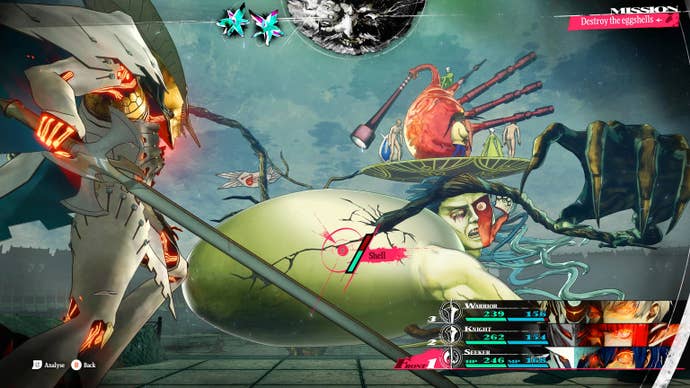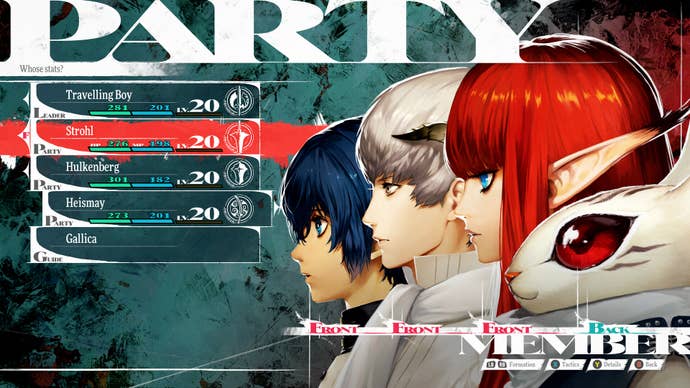Have you ever seen ‘The Garden of Earthly Delights’ by Renaissance painter Hieronymus Bosch? It’s a messed up little curio of a piece, painted across three panels and representing the breadth of humanity’s foibles, from the Garden of Eden to a frigid hellscape of our own making. Created in the early 1500s, the work was controversial; it depicted potentially blasphemous ideas about humanity, and projected a bleak sense of doom – not the pious optimism of other religious works of the era.
Funny, isn’t it, that Atlus’ latest RPG seems to lean heavily on Bosch-ian influences? The main enemies in the game, named (notably) humans, all look like Bosch’s fantastical and heretical creations. Whether Atlus is having you smack around some cavorting nudes that look like they’ve been taken straight from a panel of his works, duel it out with fantastical compound animals, figure out how to mess up some oversized fruit, or simply having you explore some hybrid stone formations, you cannot escape the shadow of Bosch in the entire 80+ hour playtime.
Bosch created his works during a time of change. The Renaissance was in full swing, and Europe was torn between more traditional Medieval values and a dawning age of progressive religious enlightenment. His work captured the tension well, and is totemic of a world at odds with itself. It’s no surprise that Atlus explicitly references Bosch in the not-at-all subtly-named Metaphor, because it’s doing the same thing. And it does it so well.
Before Metaphor, I think the best game to examine the tension between ‘the good of the people’ and ‘the fucked-up nature of state religion’ was Final Fantasy 10. Churches, pilgrimages, a big floating space whale called Sin, and a bunch of agnostic agitators on a quest to kill the root of all evil; do you think Square Enix was trying to say something? Now, Metaphor proudly and boldly takes up the mantle, plotting out a story where you are somehow both a monarchist and anti-religious agitator, and righting the wrongs of organised religion with every step you take.

It’s controversial. And weird. And sometimes, even, confused in its messaging. But that’s good; plotting an assassination on a politician and dismantling the dogma of a church is never going to be a straight line, is it? Like the Persona games before it, Metaphor manages to balance these heady, big ideas with moments of genuine introspection – and some remarkable character work.
You can go from having 12 days to break into a prince’s airship to loot his special magic formulae to cooking bread with a fantastical bat-creature in a heartbeat. You can bungee-jump into a chasm to raise your courage in the morning and console a grieving mother about her dead baby in the evening. It’s a trip. Like looking over the carefree nudes chilling in Bosch’s garden whilst seeing the frozen faces in a rictus of agony out of the corner of your eye, to use a laboured Metaphor (excuse the pun).

As the story continues apace, carouseling from one batshit plot point to another with all the confidence and bravado of a drunk driver, you get to enjoy the sublime crafting of the battle system. If you’ve read any of my writing on Atlus, you know that I think the ‘Press Turn’ system is the Holy Grail of RPG mechanics; it’s been in so many games, now (from Shin Megami Tensei to Persona and beyond) and I’m still not bored of it.
You get one turn icon per character, and hitting crits or exploiting weaknesses makes that icon flash, meaning you get another go. Smart players can turn four turns into eight, and do so consistently. In Metaphor, there’s also the option to gamble turns thanks to some smart class abilities, and even add whole icons to your turn by killing certain enemies in certain ways. Though built on the same foundations as Shin Megami Tensei 3’s original Press Turn system, Atlus has painted over it with something more detailed and elegant, and I think Metaphor represents the best iteration of this mechanic in all of Atlus’ oeuvre.
Press Turns make tactical thinking paramount for even the most beige encounters, and you will hum with pride if you manage to off your foes without allowing them to get a turn. In fact, in Metaphor, you are meaningfully rewarded for doing so, with more money and experience greasing your palms if you complete a battle without taking damage. Paired with the new job system – which the game calls Archetypes – you’ve got some mouthwatering RPG catnip here (especially if you play it on Hard mode).

The Archetypes themselves feel a bit Final Fantasy 5 or Bravely Default. Having each character master a variety of classes is essential, since enemies are designed to make life really hard for you if you try and brute-force through the game with just four or five classes to hand. Did you know goblins hate mages? Did you know that basilisks will basically one-hit-KO anyone on the frontline in a fight? Certain enemies will even get enraged if they see a certain class and perform some nonsense ability that allows them to take four more turns. And don’t think bosses are immune from this, either, oh no.
Atlus forces you to engage with its most intricate systems here, and it does so with aplomb. Better yet, it also makes the whole world feel more alive and rounded out within its fiction; hurling gold at a mimic as the Merchant class causes the monster to lose a turn as it scrambles to grab all the coins. Of course it would! That makes sense! World-building through gameplay mechanics like that is such a kernel of unbridled video game joy, Metaphor is packed to the gills with it.
In your down time, you’re going to want to hang out with your pals in a dynamic that falls somewhere between Persona 3 and Mass Effect 2; you know you’re heading for something big, as does everyone else, and you kinda have to enjoy the time you have spare whilst it’s there. There’s always this pressure overhead (sometimes literally, actually) and it makes all your social activities feel strained and tense. There’s this uneasy, anxious vibe to Metaphor that hits me harder than anything in Persona ever has, but maybe that’s because I’m so far removed from school life that a game about more general anxiety, racial tension, and the class struggle just feels a bit closer to home.

I would complain about the arrhythmic pace and layout of the dungeons, except there’s a part of me – the part that used to map out games with a pencil and paper, no less – that enjoys the endurance you need to show to get through them. Recovering mana and health becomes tight, even late into the game – even playing on Normal difficulty mode! The whole game is pretty easy, in the scheme of Atlus’ more hardcore efforts, but there is a knack to understanding the gimmick bosses it throws at you, and if you don’t fully engage with the class-switching mechanics and skill trees, you’ll find that most late-game optional content is simply impossible for you.
Every individual strand weaves together to form something utterly exceptional in Metaphor. It may well be Atlus’ masterpiece; well-presented, well-realised, and totally unashamed to be a big, silly, fantastical piece of role-playing genius. Don’t be put off by the fact it isn’t wearing the Persona moniker; chances are, if you love anything about the Persona games, you’re going to find it in Metaphor – but better. As a foundation for a new IP, I don’t think the developer could have done better.
Metaphor Refantazio launches October 11, 2024, on PlayStation 5, PlayStation 4, Xbox Series X and Series S, Microsoft Windows.
This review was written based on the Xbox Series X/S version of the game, and I tested both consoles during my playtime. Code was provided by the publisher.